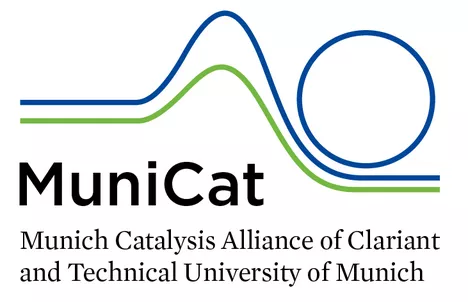What is MuniCat?

MuniCat, Munich Catalysis - Alliance of Clariant and TUM, is a strategic alliance between the entrepreneurial university TUM and Clariant since November 2010. Clariant is a chemical company with a special position in catalysis and specialty chemicals production. The strategic alliance is to establish the knowledge of both partners with regard to the research, improvement and application of already entrenched but also innovative, novel catalysts and processes. This collaboration was settled for an initial period of 10 years and is financed with up to 2 million euros by Clariant and public funding annually. After a two-year extension, the collaboration proved to be so successful that a sequel as the "Munich Alliance for Sustainable Chemistry and Catalysis" is currently being negotiated for the start in 2023.
The focus on catalysis research in the MuniCat alliance results from the exceptional role of catalysis as an essential cross-sectional technology in the chemical industry. Catalysis represents the center of energy- and reactivity-efficiencies in the manufacture of chemical products, especially in the environmentally friendly conversion of toxic products. Prominent examples include the catalytic cracking of fossil feedstocks into basic chemicals, the shift to renewable resources and feedstock, and their catalytic conversion into valuable chemical products. Likewise, catalysts are present in everyday life in broad variety, such as catalytic exhaust gas purification in mobile and stationary applications.

This key role of catalysts and the inherent associated process technology is reflected in the research areas of the MuniCat Alliance. In addition to the research into novel methods for catalyst shaping and forming, chemical processes such as synthesis gas chemistry are highly in the focus, particularly with regard to optimized CO2conversion. Also regenerative hydrogen production and chemical hydrogen storage are part of the research portfolio. Explicit research projects include 'Lower Olefin Cluster', 'ShrinkSim - Simulation of catalyst-packing shrinkage' and 'Phthalic Anhydride: By-product Minimization by Layer Management'. These and many other completed and ongoing projects can be found under the Research tab.
In TUM's overall strategy of bundling university research in chemical catalysis, the strategic cooperation with Clariant plays an important role. The research alliance is integrated into the Central Institute for Catalysis Research at TUM (Catalysis Research Center, CRC). MuniCat has been based in the new CRC building since 2016. The CRC unites the broad scientific spectrum of TUM in the field of catalysis research into an industry-oriented focus. In the spirit of an Industry on Campus concept, TUM scientists work together with Clariant researchers on important research issues of basic and applied in the field of industrially applicable catalysis.